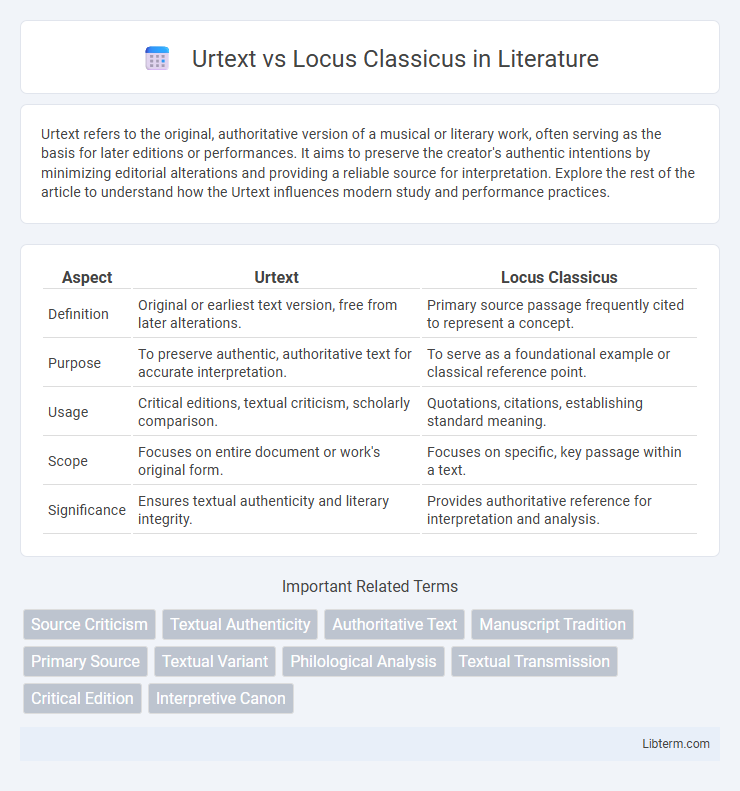Urtext refers to the original, authoritative version of a musical or literary work, often serving as the basis for later editions or performances. It aims to preserve the creator's authentic intentions by minimizing editorial alterations and providing a reliable source for interpretation. Explore the rest of the article to understand how the Urtext influences modern study and performance practices.
Table of Comparison
| Aspect | Urtext | Locus Classicus |
|---|---|---|
| Definition | Original or earliest text version, free from later alterations. | Primary source passage frequently cited to represent a concept. |
| Purpose | To preserve authentic, authoritative text for accurate interpretation. | To serve as a foundational example or classical reference point. |
| Usage | Critical editions, textual criticism, scholarly comparison. | Quotations, citations, establishing standard meaning. |
| Scope | Focuses on entire document or work's original form. | Focuses on specific, key passage within a text. |
| Significance | Ensures textual authenticity and literary integrity. | Provides authoritative reference for interpretation and analysis. |
Understanding Urtext: Definition and Origins
Urtext refers to the original manuscript or earliest version of a text, serving as the authoritative source from which all later copies and editions derive. Originating from biblical and classical studies, the term emphasizes the restoration of a work to its purest form, free from later interpolations or edits. Understanding Urtext is crucial in textual criticism for reconstructing the most accurate representation of historical writings.
Locus Classicus: Meaning and Historical Context
Locus Classicus refers to the original or most authoritative passage in classical literature or ancient texts that defines or exemplifies a particular concept, phrase, or usage. Historically, these texts serve as critical reference points for scholars and philologists to establish the authentic and primary meaning of terms in ancient languages such as Latin and Greek. Locus classicus passages are foundational in classical studies, textual criticism, and etymological research, providing context and clarity amid variant manuscript traditions.
Key Differences Between Urtext and Locus Classicus
Urtext refers to the original version of a text, emphasizing authenticity and the absence of later edits or interpretations, whereas Locus Classicus denotes a passage that serves as a standard or authoritative example for a concept or term. Urtext prioritizes historical accuracy and textual purity, often used in biblical, musical, or literary studies to identify the source material. In contrast, Locus Classicus functions as a reference point in scholarly or linguistic contexts, highlighting its role in exemplifying or defining ideas rather than preserving an original document.
The Role of Urtext in Scholarly Research
Urtext plays a crucial role in scholarly research by providing the original or earliest version of a text, free from later alterations or interpretations, ensuring authenticity and accurate textual analysis. It serves as the authoritative source for critical editions, enabling researchers to trace the evolution of manuscripts and establish a reliable foundation for academic study. In contrast, loci classici function as definitive passages within texts for citation or interpretation but rely on the underlying stability ensured by the Urtext.
Importance of Locus Classicus in Academic Studies
Locus classicus refers to the authoritative source or original passage in academic studies that establishes the fundamental basis for a concept or theory, ensuring accurate interpretation and scholarly consensus. Its importance lies in providing a definitive reference point that scholars and researchers rely on for validating arguments and tracing the evolution of ideas across disciplines. Unlike the Urtext, which represents the earliest version of a text, the locus classicus serves as the established benchmark critical for academic rigor and contextual understanding in research.
Urtext and Textual Authenticity
Urtext manuscripts are considered the most authoritative sources for establishing textual authenticity as they represent the original version of a text before later alterations or editorial changes. Scholars prioritize Urtext because it provides a reliable foundation for accurate transcription and interpretation, minimizing the risk of corruption introduced in subsequent copies. Unlike a locus classicus that refers to a well-known authoritative passage, Urtext emphasizes the entire original composition, ensuring fidelity in critical editions and scholarly research.
Locus Classicus and Citing Authoritative Sources
Locus classicus refers to the definitive or most authoritative passage in classical texts that scholars cite to support specific interpretations or arguments. It serves as a foundational reference point, often cited by authoritative sources to establish historical or literary authenticity. Rigorous citation of locus classicus passages ensures academic precision and reinforces the credibility of scholarly work.
Urtext vs Locus Classicus: Practical Examples
Urtext editions provide the earliest or most authoritative version of a musical score, often used by performers and scholars seeking authenticity in interpretation. Locus classicus refers to a primary or definitive source text frequently cited to establish the original meaning of a passage, especially in classical literature or biblical studies. Practical examples highlight Urtext scores in Beethoven's sonatas offering unaltered notation contrasted with locus classicus citations such as the Hippocratic Corpus used as foundational references in medical literature.
Impact on Interpretation and Analysis
Urtext editions provide a critical, authoritative version of a text based on original manuscripts, allowing scholars to analyze the author's intended meaning without later editorial changes. Locus classicus refers to the definitive passage or citation that establishes the primary meaning or authority of a concept, often serving as a key reference point in literary or legal analysis. The use of Urtext editions clarifies textual ambiguities, while locus classicus anchors interpretative frameworks, together enhancing precision and depth in textual analysis.
Choosing Between Urtext and Locus Classicus in Research
Choosing between Urtext and Locus Classicus in research hinges on the need for original authenticity versus authoritative interpretation. Urtext editions provide the most accurate and unaltered versions of original texts, critical for textual analysis and historical accuracy. Locus Classicus serves as a key authoritative passage that exemplifies a concept, valuable for contextualizing ideas within scholarly discourse.
Urtext Infographic

 libterm.com
libterm.com